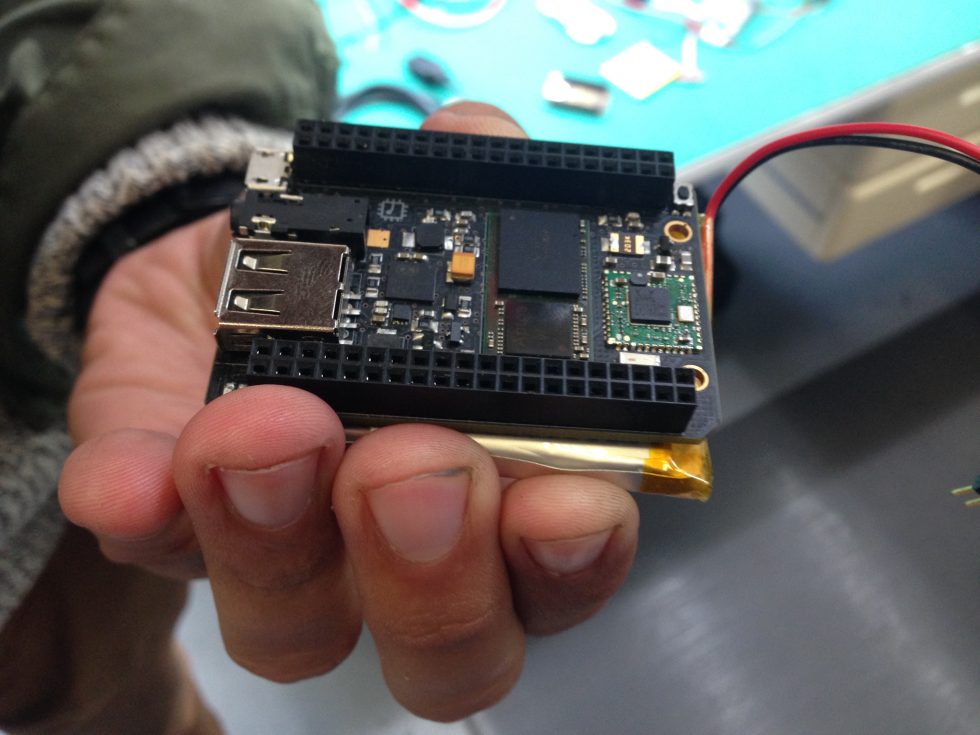
OAKLAND, Calif.—Tucked away in a small office on a side street in the historic industrial zone of West Oakland, something magical is happening.
Dave Rauchwerk and a team of eight people are creating a $9 computer, designed to dovetail the success of their $249 Raspberry Pi-based camera. Their $1 million venture-backed startup, Next Thing Co., aims to put this crazy-cheap, hackable computer into the hands of as many people as possible.
The computer—known as the CHIP—hit Kickstarter on Thursday. Already it’s blown through its target goal of $50,000. As of this writing, the company has raised over $407,000 from over 8,000 people, including this reporter.
The CHIP is in the vein of small, Linux-based, inexpensive computers, like the Raspberry Pi and the Beagle Board. Crucially, though, it has built-in Bluetooth and Wi-Fi, so you won’t have to sacrifice a USB port. The computer runs a 1Ghz R8 ARM processor and hums along with 512MB of RAM, and 4GB of flash storage. It also has a full-sized USB port, and a composite video out, so it can work with older televisions.
In many ways, the CHIP is the antithesis to the company’s previous Kickstarter-funded project, the OTTO camera: an extremely well-designed Raspberry Pi-based "hackable GIF camera." (That camera is shipping now.) While the OTTO is relatively expensive (at $249) and is a modern, retro-inspired goofy toy, the CHIP, meanwhile is much more basic.
-
When mounted into a Pocket CHIP, you've got a pocket-sized computer. (A pencil eraser works surprising well as a stylus.)
-
To save money, Next Thing decided to go with a stripped down keyboard.Cyrus Farivar
-
The underside recalls an older circuit board design.Cyrus Farivar
-
Here are some initial sketches for the Pocket CHIP.Cyrus Farivar
-
More initial sketches for the Pocket CHIP.Cyrus Farivar
-
Next Thing's workspace is any maker's dream.
-
The startup's workspace is meticulously organized.Cyrus Farivar
-
The team relaxes in these found airline seats.Cyrus Farivar
-
Dave Rauchwerk is one of the co-founders of Next Thing.Cyrus Farivar
After Next Thing finished the OTTO, the team sought to make a cheaper computer, Rauchwerk explained to Ars on Saturday morning.
"We didn’t want to compromise anything, but [we realized] the computer that powers it is really expensive," he said. "So we went to China and had conversations and knew how much it needed to cost—we ended up with a $9 computer. $9 isn't the magic number, but $99 is the magic number for selling products."
One of those first sub-$99 products is a "hacker Game Boy," better known as the "Pocket CHIP," a $49 handheld touchscreen, case, five-hour battery pack, and stripped down keyboard—containing the CHIP itself, naturally—that is a fully-functional Linux computer.
"We've worked with all kinds of different computer that you can build into things, and we wanted to be able to carry it around with us," Rauchwerk added. He demonstrated, using a prototype design, that it could easily fit into the rear pocket of his jeans.
"What we're doing is taking technology from tablets from a few years ago and making it palatable and smoothing over the rough parts so that [people] like us can use it for projects," he added. "The thing that's really exciting is that if we as a community can agree on a chip to support and a platform and some software we can make sure that a $9 computer is a thing."
The company was founded in 2014 and was a product of HAX Accelerator, a hardware-based accelerator program based in Hong Kong and Shenzhen, China. After graduating from the program, Rauchwerk and his colleagues set up shop in West Oakland last summer.
While the CHIP is marketed initially as effectively a hacker toy, its low price could be attractive for users in parts of the developing world. Notably, it could be what the One Laptop Per Child project never became. Rauchwerk said he has already received e-mails from potential customers as far away as Maputo, Mozambique.
"We're not the people that are best suited to go to a developing country and help people onboard with tech," he admitted. "We think it's awesome—that's something we want to make happen."
Thanks to David Scheltma from Make magazine for introducing us to Next Thing.
reader comments
133